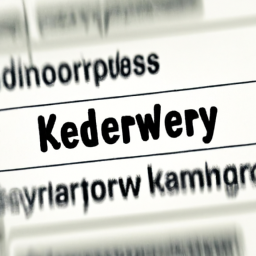Demystifying the Keyword Difficulty Index Tips for Writing SEO Content
Keyword Difficulty Index
What is the Keyword Difficulty Index?
The Keyword Difficulty Index (KDI) is a powerful tool used to measure how difficult it is to rank for a specific keyword in search engine results. The value of the KDI ranges from 0 to 100, with higher values indicating greater levels of competition. This index plays an integral role in SEO strategy, as it helps marketers optimize their content targeting efforts.
KDI aims to provide a precise assessment of the level of difficulty associated with ranking in the search engine. It does this by taking into account several factors, including the volume of monthly searches, the number of websites competing for the same keyword, the number of backlinks a site has and the domain authority of the top-ranking websites. With this information in mind, the KDI arrives at a score that helps marketers decide the usefulness of a certain keyword and the competition they could potentially face in their efforts to rank for it.
Benefits of using the Keyword Difficulty Index
One of the main benefits of using KDI is that it provides a realistic insight into the competitive landscape for a certain keyword. It enables marketers to decide which keyword to focus on and which to ignore, as well as the types of strategies required to help them rank for the chosen keywords. Here's a look at three other primary benefits of the KDI:
- Time-Saving: KDI allows marketers to prioritize their efforts and minimize the amount of time and resources they would have to invest in optimizing for the wrong keywords. This saves a lot of time, improves productivity, and speeds up overall SEO success.
- Accuracy: KDI helps marketers track how their efforts towards ranking for a particular keyword are working out. For instance, if the KDI score of a certain keyword has increased, it means that the keyword is more difficult to rank for, and it might be time to switch to another keyword.
- Data-Driven Optimization: KDI helps marketers make decisions based on accurate data instead of making assumptions based on their own experience. This brings greater accuracy and success to SEO efforts and improves overall ROI.
How KDI can help with Search Engine Optimization
KDI takes into account several factors that are important for success in organic search. Its data and algorithms can provide valuable insight into how to optimize for a keyword to improve its performance, including increasing the overall relevance of the content or website, establishing relationships with other websites, developing a link wheel, deriving traffic from social media or other sources, etc. The index can also be used to identify what strategies are being employed by other websites to maintain a good position in the SERPs for a certain keyword.
Conclusion - The Final Word
KDI is an effective tool for marketers seeking to understand the competitive landscape for a specific keyword. It provides helpful insights into the required optimization strategies to rank for the chosen keywords and measure the success of such efforts. As such it provides valuable data to help marketers optimize their search engine optimization (SEO) efforts.
Takeaways
- KDI is a powerful tool to measure the difficulty related to ranking for a certain keyword in the search engine.
- KDI provides marketers with valuable insights into the competitive landscape for a specific keyword.
- KDI helps marketers decide which keyword to focus on, as well as the types of strategies to optimize for it.
- KDI allows marketers to track how their efforts towards ranking for a particular keyword are working out.
- KDI helps marketers make decisions based on accurate data and optimize their SEO efforts.
